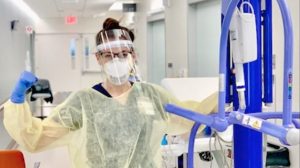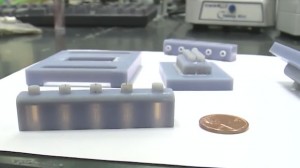NEW YORK (Reuters Health) – The hope of finding a way to quickly measure carboxyhemoglobin levels in suspected carbon monoxide poisoning is still unfulfilled, it seems. The Rad-57 pulse CO-oximeter, approved by the Food and Drug Administration, is not sufficiently sensitive to be relied on in the ER, researchers report.
Dr. Michael Touger, and colleagues in the emergency medicine department at Jacobi Medical Center, Albert Einstein College of Medicine, Bronx, New York assessed the agreement between readings obtained with the Rad-57 device and standard laboratory measurements in 120 patients with suspected carbon monoxide poisoning.
As described in the October issue of the Annals of Emergency Medicine, the researcher defined a priori an acceptable variance of +\- 5% with the OC-oximeter compared with lab values. The results showed that the discrepancies ranged from -11.6% to +14.4%
“Forty of 120 (33.3%) of the differences fell outside the chosen clinically acceptable range of differences (+\- 5% carboxyhemoglobin) between methods,” Dr. Touger and colleagues found.
Lab tests identified 23 patients with a carboxyhemoglobin greater than 15%, which has been proposed as a threshold for further treatment and referral to emergency hyperbaric oxygen treatment. Rad-57 correctly identified 11 of the 23 cases, for a sensitivity of 48%. In one instance, the device gave a false-positive reading above 15%, yielding a specificity of 99%.
The investigators conclude, “In the range of carboxyhemoglobin values measured in this sample, the level of agreement observed suggests (Rad-57) measurement may not be used interchangeably with standard laboratory measurement.”
In an editorial, Dr. William H. Maisel with Beth Israel Deaconess Medical Center, Boston, Massachusetts and two colleagues point to the “stark contrast between the Rad-57 performance under real-life, clinical circumstances as reported by Touger et al and its performance as reported by the manufacturer in data submitted to the FDA (Food and Drug Administration).”
The editorialists note that the FDA has commissioned the Institute of Medicine to study the premarket device approval process. “Ideally,” they say, “premarket evaluation should describe and predict the clinical performance of diagnostic devices.”
Reference:
Performance of the RAD-57 Pulse Co-Oximeter Compared With Standard Laboratory Carboxyhemoglobin Measurement
Ann Emerg Med. 2010;56:382-388.




